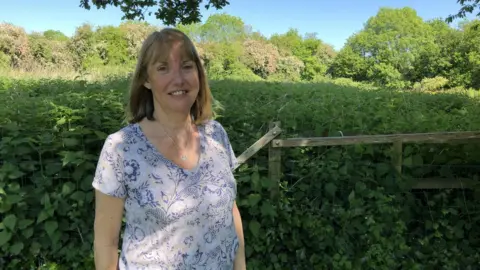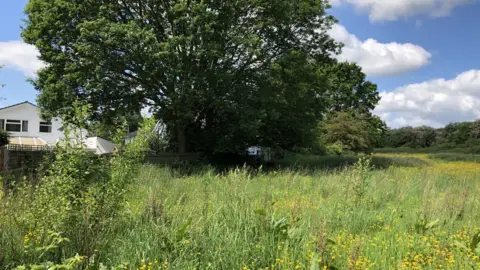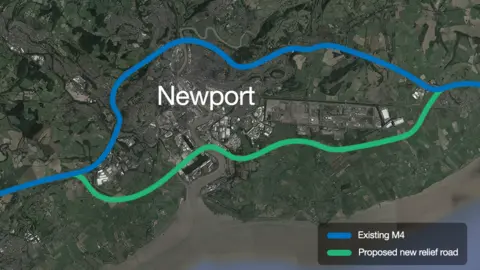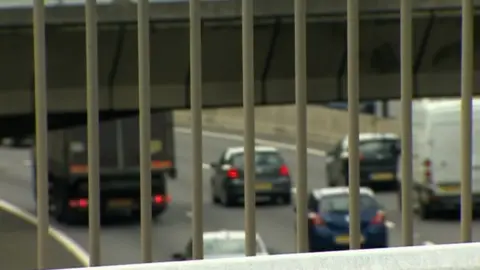M4: New road plan to ease congestion divides opinion
It has been branded an "attack on nature" by some and a "godsend" by others - but nearly 30 years of uncertainty is set to finally end with a decision on the M4 relief road.
A statement on the £1.4bn project is expected on Tuesday.
The controversial 14-mile (23km) six-lane motorway would be built south of Newport to relieve congestion at the Brynglas tunnels.
But whether the road would bring relief depends where you live.
Villagers in Magor, Monmouthshire, where the new road would split from the existing M4, have lived with the proposal for years. A relief road was first suggested in 1991.


Some fear the new road would leave "two-thirds of the village surrounded" by motorway.
"I know people say 'not in my back yard' but for us, it really is going to feel that it's in our garden," said Carole Poultney, 63.
"We're keeping our fingers crossed. We've lived with this idea for a long time.
"We can already see and hear the motorway from our house but now it could be 50 yards from our back door."
Their homes are already close enough to the carriageway not to need the radio for traffic updates - they simply look out of the kitchen window.
And as the England rugby team discovered when travelling to a Six Nations clash with Wales in Cardiff in February, it can sometimes take more than an hour to travel a few miles.
Both sides of the argument agree that "something" needs to be done to ease congestion. The question is... what?
 BBC/Google
BBC/GoogleFor some Magor residents, the uncertainty is an issue.
"I'm really concerned because I don't know how this is going to affect us but it would have to be dreadful for me to actually pack up and leave," said Sandra Teale, 64.
"You can't have everything. People didn't want the services [a motorway service station at junction 23A] but when they came they brought work. We'll just have to get on with it."
Tonew Kennels in Redwick - home to up to 100 dogs, including strays and abandoned pets - lies almost directly in the path of the proposed route.

Co-owner Mandy Jones said they are still unsure whether they might be the subject of a compulsory purchase order.
"I don't even want to think about leaving, it's just too upsetting," she said.
"It would be horrendous to leave. We've been here since 1967 when my father built this house. It's not just our business but the family home as well."
The kennels are located on the Gwent levels, described as "Wales' own Amazon rainforest" by conservationists who say the new motorway would be a "direct attack on nature".
However, nine miles along the motorway to the infamous Brynglas tunnels and you arrive at the other side of the argument.

Terry and Janet Clark were the first to own their house on Bryn Bevan, Malpas, overlooking the tunnels, 45 years ago.
They say the volume of traffic has increased significantly since then, and they would welcome the construction of a relief road.
"It's dreadful living so close to the tunnels. It's noisy and dirty all the time because of the traffic. It's 24-7... It doesn't stop even for five minutes," said Mrs Clarke.
"It's terrible trying to get to sleep, especially in the summer on hot evenings, you can't have the windows open. Guests who come to stay don't get a wink of sleep.
"And the dust is a nightmare. Everything outside gets dirty and it affects our chests - we get quite a lot of coughs. So a relief road to divert some of the traffic away would be lovely."

After tolls on the Severn bridges ended in December there was a rise in traffic of more than 10%.
Mr Clarke says the number of heavy goods vehicles (HGVs) has increased since too.
"There are a lot more lorries now - especially at night," he said.
"I know that's good for Wales and business, but not everyone has to live with it. Something has to be done - I just don't know why it's taken so long."
Neighbours have become so accustomed to the "constant drone" of noise that they find moments when the motorway is closed - due to roadworks or an accident - as "eerie".
Some are sceptical as to whether a relief road will solve the problem of ever-increasing traffic.
However David Bird, who has raised a family in the shadow of the tunnels, believes it would be a "godsend".

His 30-year-old son Steven uses the M4 to commute most days to Bristol - an experience he describes as "painful".
"It's very easy for a 10-hour day to turn into a 12-hour day because you're stuck in traffic from the bridge.
"A relief road would make our lives easier - I could get to work on time, spend less time on the road and have more time to go about your day.
"It would also be quieter at home and perhaps house prices would go up a bit."

If you have any questions about the M4 relief road, use the form below to send them in:
If you are reading this page on the BBC News app, you will need to visit the mobile version of the BBC website to submit your question on this topic.
